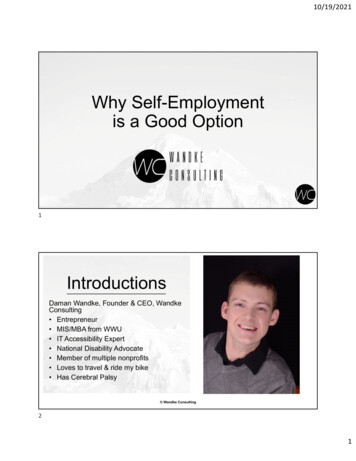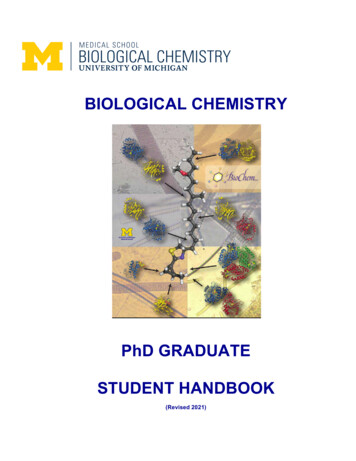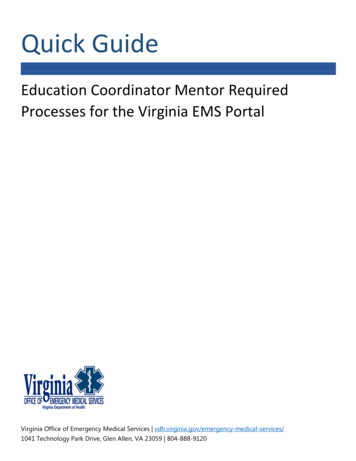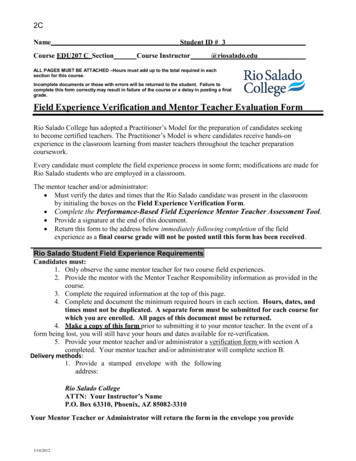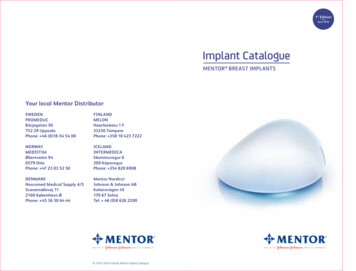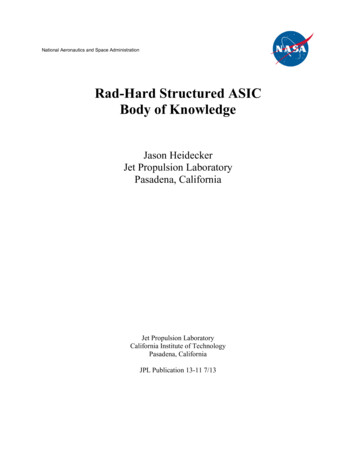
Transcription
Mentor Training ManualThe Non-Traditional Student Peer MentoringProgramCarroll College1
Table of ContentsCarroll College Mission Statement .3Program Mission .5Non-Traditional Student Peer Mentoring Program Overview 6Conversation starters . 7Skills for Effective Mentors 8Carroll College support resources. 10Ethical Considerations for the Peer Mentor 11Importance of Trust . .12Common Issues for Non-Traditional Students .13Common Issues you will assist students with 14Challenges you may encounter as a mentor .15What to expect from the Non-Traditional Student Advisory Council .16Reporting Program Progress on Moodle .17Establishing Effective Study Skills. 18Programming Group Activities .22Highlights from the Carroll College Student Handbook .23Wrapping the year, completing exit questionnaire .24APPENDIX A: Exercise 1.2 . . 25APPENDIX B: Acknowledgement of Risk Form . .26APPENDIX C: Activity Proposal Template .27APPENDIX D: Request for Payment Form .28APPENDIX E: Weekly Schedule Template . 29Acknowledgement Training & Agreement to Participate . 30References .312
Carroll College Mission StatementCarroll College is a Catholic, diocesan, liberalarts college in the ecumenical tradition of theSecond Vatican Council.As a liberal arts school, Carroll Collegeacknowledges the practical role of preparing itsstudents for a career, but it also affirms thetraditional role of providing for the expansion of the intellectual, imaginative, and socialawareness of its students. It is dedicated to providing for its students the means for their fullrealization of a dual goal of vocation and enlightenment. Thus, while providing substantialprofessional and pre-professional programs, the College encourages and expects all students toparticipate in a broad spectrum of academic disciplines.As an academic community, Carroll College affirms its commitment to the principle of freedomof inquiry in the process of investigating, understanding, critically reflecting upon, and finallyjudging reality and truth in all fields of human knowledge. As value-oriented, Carroll College iscommitted to and deeply involved in the further dimension of free deliberation and decisionmaking regarding values and personal commitment. Each student at Carroll, through personaland institutional means, is exposed to value systems with which one can readily identify,including secular values such as the worth of work and the use of the intellect, humanistic valuescentering on the uniqueness and dignity of the person, and religious and moral values concernedwith one's relationship to God, self, and others.As a Catholic college, Carroll is obligated to treat judgments concerning ultimate reality anddecisions concerning ultimate value at both an academic and a pastoral level. This obligationinvolves the College's relationship to the Magisterium of the Catholic Church, defined as "theperennial, authentic, and infallible teaching office committed to the Apostles by Christ and nowpossessed and exercised by their legitimate successors, the college of bishops in union with thepope." Carroll College is committed to present faithfully within its curriculum the magisterialteachings of the Catholic Church. At the same time, it acknowledges the special role of thetheologian, who-although not a part of the authoritative teaching body of the Church-makesavailable to the Magisterium his or her scientific competence, while acting as a mediatorbetween religion and culture by carrying on an academic dialogue with philosophy, science, theliberal arts, the believing community, and secular society.3
As a college founded by and related to the Diocese of Helena, Carroll has a special obligation toprovide for the spiritual needs of the college community. At the same time, the resources of theCollege's Theology Department and campus ministry organization are available for the specialreligious needs of the diocesan community as a whole. Moreover, Carroll College rededicates itsspiritual, academic, and social resources to the service of the citizens of Montana, its home, andto the worldwide human family through continuing efforts to guarantee to individuals, to groups,and especially to minorities the right to life, to personal and social dignity, and to equality ofopportunity in all aspects of human activity.In the ecumenical tradition of the Second Vatican Council, Carroll College is committed to apolicy of open participation by members of all religious faiths and all persons of good will in thetotal academic and spiritual experience of the college community. While standing fast by theteaching of the Catholic Church, and avoiding a false conciliatory approach foreign to the truespirit of ecumenism, Carroll College welcomes in love and respect the full participation of otherChristians and non-Christians in an ecumenical dialogue and in a truly humble and charitablejoint venture in the common search for the Ultimate Truth and the Ultimate Good which is thefinal goal of all education.Officially adopted by the Carroll College Board of Trustees May 26, 19784
The Non-Traditional Student Peer Mentoring Program MissionThe Mission of the Carroll College Non-Traditional Student Peer Mentoring program is toconnect, engage, and retain Non-Traditional students at Carroll College. The Carroll CollegeNon-Traditional Student Peer Mentoring program fulfills its mission by pairing Non-Traditionalstudents who have completed two or more semesters at Carroll College with new and transferNon-Traditional students in a one on one peer mentoring capacity. For the purpose of theCarroll College Non-Traditional Student Peer Mentoring program a “Non-TraditionalStudent” is anyone who based on age, role, or life experience upon coming to CarrollCollege self identifies as different from the average student at Carroll College. Thispurposefully broad definition of Non-Traditional students is intended to solicit a diverse array ofmentors and mentees who can share and bond not only over their similarities but in theirdifferences. The Carroll College Non-Traditional Peer Mentoring program is based in theliterature on cross aged peer mentoring and academic outcomes of Non-Traditional students inpost-secondary environments. “The peer mentor role is fundamentally based on having aseasoned peer interact with targeted students, sharing his or her knowledge and experience, andthereby improving students understanding and learning (Minor, 2007).” The overarching goal ofthe Carroll College Non-traditional Student Peer Mentoring Program is to facilitate relationshipswhere seasoned Non- Traditional students help incoming and transfer Non-Traditional students,navigate the academic and social demands of Carroll College.Students interested in participating as a mentor in the Non-Traditional Student Peer Mentoringprogram will undergo an application and interview process. Students who are interested inparticipating as a mentee will need to reach out to the Office of Veteran’s Services prior to thestart of the fall term. Mentors and mentees will be paired based on common major or commonintended major.5
The Non-Traditional Student Peer Mentoring Program OverviewNon-Traditional Student Peer Mentor Qualifications: Must be a Non-Traditional Student, who has completed two or more semesters at CarrollCollege.Must have strong writing and oral communication skills; and be comfortable engaging inboth public speaking and individual mentoring sessions.Must have a cumulative GPA of 2.5 of higher.Must have completed an application and interview with a member of the Non-TraditionalStudent Advisory Council.Must be selected to participate as a mentor in the Non-Traditional Student PeerMentoring program.Must commit to participate in the Non-Traditional Student Peer Mentoring program forthe entire academic year.Job Description: Assisting your mentee with their transition to Carroll College by being knowledgeableabout academic programs, support resources, and engagement opportunities. Contacting your mentee to facilitate a bi-weekly meeting to discuss their experienceacademically and socially. Hosting a two hour study group with your mentee, at agreed upon time and place that fitsboth the mentor and mentee’s schedules twice per month. Arranging for your mentee to participate in one social activity per month, which engagesthem in a wider group of their Carroll College peers. Helping with the planning and implementation of two group activities one academic andrecreational with others participating in the Non-Traditional Student Peer Mentoringprogram.Benefits: Personal fulfillment gained through contributing to your community and peers. Enhanced skills in coaching, listening and role modeling. The opportunity to practice and develop a more personal style of leadership.Time Commitment: Attending initial one day peer mentor training. Meeting with your mentee for a one hour check-in twice per month. Meeting with your mentee for a two hour study group twice per month. Meet with mentee monthly for a social activity. Meet with other mentors as needed to plan and implement two Non-Traditional studentgroup activities per academic year.6
Conversation StartersAs a Non-Traditional Student Peer mentor you should be in regular communication with yourmentee. You will have specific reasons to approach them such your twice per month one hourcheck in session, your twice per month two hour study group, meeting once per month for asocial outing, or meeting once per semester for a group activity. As the mentor it is yourresponsibility to reach out to your mentee. Try using a conversation starter.The following are some ideas to start up conversations with your mentee and set up yourinitial meeting. Send them an email or call, introduce yourself as their Non-Traditional Student Peer mentor,provide three relevant details about yourself you want them to know ( major, year,hometown) explain your role, list upcoming program dates, suggest some times/ dates tomeet, suggest a neutral location (such as the STAC) to meet initially.Send them an email or call, introduce yourself as their Non-Traditional Student Peer mentor,explain your role, ask about the classes they are taking how they are going, ask what theirmajor or intended major is, and if they have a similar major, offer to get coffee and talkabout your experience with some of the Professors in that department.Send them an email, introduce yourself as their Non-Traditional Student Peer mentor, explainyour role, ask if they have any extracurricular interests that they would like to pursue atCarroll, have pursued at other institutions, or were involved in high school. Tell them aboutany extracurricular activities you participate in, clubs, or groups you are involved at Carroll,ask whether they would like help locating a particular group on campus.7
Skills for Effective MentorsKeys to success: ListenAsk open ended questionsAsk open ended questions- In other words questions that elicit a YES or NO answer are lesshelpful than questions that elicit more information about the situation such as “ What, When,How, Who” questions. Be mindful that “why” questions may seem like they would conveyconcern and a desire for more information but they can also come off as judgmental and causeyour mentee to shut down. For example in response to your mentee saying the he or she is reallydisappointed with the grade they got on their last BIO exam, and that they wish they had studiedmore asking “Well, why didn’t you go to all the study sessions?” may cause your mentee to feeljudged.8
Skills for Effective Mentors Attend and respond to both content and feelingWhen appropriate let your mentee solve the problemAttend and respond to both occurrences and emotional reactions to occurrences- When yourmentee comes to you wanting to be heard about a social or academic issue listen and carefullyrespond both to the occurrence that is effecting them and they emotions that they areexperiencing as a result. Take the this scenario- “My Alpha seminar Professor emailed me thismorning saying we needed to meet within the next couple of days I am really panicking” Theoccurrence in the case is the eminent request for meeting from the Alpha seminar professor. Theemotional reaction is the panicking. It is important to attend to both.Offer encouragement and support by asking open-ended clarifying questions, but ultimately letyour mentee come up with a solution to the problem- It may seem easier or more rewarding tooffer advice or give suggestions of what you would do if you were in their situation but that isnot as helpful as it may seem. You do not know the whole situation, and it is better to refer yourmentee to someone with the professional training to guide them through their issue. Usually yourmentee will have an idea of the steps he or she needs to take to begin solving their dilemma, byasking open ended questions you will help your mentee clarify the next steps to approachingtheir situation. (SEE APPENDIX A: Pg. 23 for Scene).9
Skills for Effective Mentors Refer to/use your resourcesIn order to be a successful mentor, you will need to develop a diversity of academic and socialskills. In many cases you will deal with issues in the realm of academic as well as social growth.It is paramount to remember in these situations that you are neither a counselor nor a trainedacademic resource; however you do have access to these individuals. Know your limitssometimes the best way to help is by referring your mentee to someone with the specificexpertise to help.Carroll College has a diverse pool of professionals ready and willing to assist students with theiracademic and social challenges. Please familiarize yourself with the table of resources on page10. And refer to it often in the event that you may find it relevant to refer your mentee or even afriend to one of these valuable resources.RESOURCESERVICEPERSONNELCONTACTHOURSThe AcademicResource Center(ARC) providesacademic support tohelp students improvetheir chances ofachieving academicsuccess.-subject tutoring-tutoring in writing-study skillsworkshops-college success skills-disability support-alternate or make upexamsAcademic ResourceCenter Director,Kevin HadduckOffice Phone406-447-4504Borromeo Hall Rm.115Office hoursM-F8:30am -5:00pmThe Carroll CollegeCounseling Servicesis a free andprofessional serviceavailable to studentswere they can talk witha counselor who isobjective and is askilled listener.-depression-eating issues-gambling-helping a student gethelp-relationships-self-inflicted violence-sexual safety-academic stress-and more-acute symptoms checkup (flu, cold, etc.)-immunizations.-Weekly evaluationswith a nursepractitioner.Director of CounselingServicesK Mike FrankinEdD. LCPCOffice Manager406-447-5441Office hoursM-F9:00am- 12:00pmNurse, Kerri RigsbyNurse KathleenThudnowskiOffice MangersCarol AndersonCarmen McFerrinOffice Mangers406-447-5441Office hoursM-F9:00am-12:00pm1:00pm-4:00pm-career exploration-the Hunthausencitizenship award-academic internships-testing service-volunteeropportunitiesCareer ServiceDirector, RosalieWalshCareer ServicesMain OfficeOffice hoursM-F9:00am-5:00pmThe Carroll CollegeWellness Center offersquality health care toCarroll students (mostlyfree of charge!) Visits tothe Wellness center areconfidential per the legalstandards of Montanaconcerning privilegedcommunication.Carroll CollegeCareer Servicesempowers students tofollow their passion,realize potential, andpursue lives ofpurpose.Counselor, KyrieRuss MS.For afterhoursemergencies contactthe Community LivingHall nship CoordinatorNisan Burbridge10
Ethical Considerations for the Peer MentorAs you serve in your role as a peer mentor it is important that you practice ethical behaviors.You were selected for this position based on you combined academic, leadership andinterpersonal strengths. Those same interpersonal strengths that make you a well-qualifiedcandidate for this position also can open you up to some challenging interpersonal situations withyour mentee.Ethical Standards1. Peer mentors will respect the individual dignity and autonomy of their mentees andfellow mentors.2. Peer mentors will not act beyond the scope of their qualifications. In the event of asituation that requires higher level professional expertise they will refer their mentee tothe appropriate professional.3. Peer mentors will assume the responsibility for consulting a member of the NonTraditional Student Advisory Council in the event that they themselves are unable todirectly refer their mentee to the appropriate professional resource. Or in the event that aconflict has arisen between themselves and their mentee and they are no longer objectiveand would like assistance seeking professional resources to resolve the conflict.4. Peer mentors will abstain frombecoming romantically or intimatelyinvolved with their mentees. Peermentors will act appropriately whenworking with people for whom theyfeel attraction.5. Peer mentors will remember thatthey are role models obligated tomaintain congruence between whatthey say to their mentees and the waythey present themselves in otherpublic facets of their lives.11
Importance of TrustWhen someone shares something personal with you a bond of trust is formed, in some cases it isyour responsibility as the mentor to uphold that bond by listening attentively to what yourmentee is telling you.In other cases it is your responsibility to uphold that bond of trust by listening carefully to youmentee, asking open-ended clarifying questions, and encouraging your mentee to seek theappropriate professional help. As someone your mentee has chosen to trust with their personalinformation it is your responsibility to direct them to professionals who have the skills to helpthem.12
Common Issues for Non-Traditional StudentsMany new students have adjustment issues when they transition from the home to the collegeenvironment. However, there are some ways in which Non-traditional students, because of theirage, life experience, and responsibilities bear a unique set of challenges when transitioning to thecollege setting.Below are some of the issues you may encounter. When assisting students with these issues besure to talk with a member of the Non-Traditional Student Advisory Council if you needassistance locating a resource.Personal Challenges: Balancing multiple responsibilities: “Older Students, (those more than 25 years)generally have at least four non-traditional factors: financial independence, full-timeemployment, dependents, and part-time enrollment. Therefore many older students fallinto Horn’s highly non-traditional categoryi, placing them at risk for not completingtheir degree(Kenner & Weinerman,2013)Academic Challenges: A gap in the academic development process: “Adult learners beginning their postsecondary education are likely have a gap in their academic development process.depending on how long it has been between the time that they graduated from highschool or earned their GED and their first day of college or university. A self-directed learning style: “That [leads them to] take responsibility for their ownactions and resist having information arbitrarily imposed on them. Deeply engrained procedural or practical knowledge: “They [Non-TraditionalStudents] have increased development of practical knowledge that is useful in one’severyday life. However collegiate level coursework requires adult learners to exploredifferent ways of examining and incorporating information [this transition from usingpredominantly practical knowledge to applying collegial thinking can be jarring andflustering for non-traditional students for whom, knowledge learned in the work place is apart of their psyche].Interpersonal Challenges: Social isolation: “One of the challenges for Non-Traditional Students is a high attritionrate. Studies indicate that one component leading to this high attrition rate is the lack ofsuccessful integration of Non-Traditional Students into the university environment.13
Common Issues You Will Assist Students WithAs a trained, peer mentor you will have the ability to assist your mentee with a variety of issues,and in the event that you are not able to, there will be someone with professional trainingavailable to do so. Just remember to refer to your Carroll College Support Resources table onpg. 10. If you need more or specific information outside the scope of the table do not hesitate tocontact one of the Non-Traditional Student Advisory Council members for assistance.Personal: Career questions.Questions about picking the right major, and where to declare your major.Questions on where to go to find work study, internships and summer jobs.Admission of personal, or emotional struggle (possible related to the stress of balancingacademic, family, and work obligations) which warrants your referring of your mentee tothe Carroll College Counseling Services.Academic Challenges: Managing and prioritizing study time (during twice per month study sessions).Goal setting for study sessions, set priorities for major goals that will be accomplishedwithin study sessions for the next week, month, next few weeks(during one on one checkins).Getting additional subject tutoring from the (ARC) to improve performance in a class.Getting guidance from the (ARC) on how to approach faculty about grading policies andprocedures.Getting accommodations for test takers with disabilities for the (ARC).Interpersonal Challenges: Getting to know their faculty.Weekend activities.14
Challenges You May Encounter as a MentorThere is no single method to address the challenges you will be faced with as mentor in the NonTraditional Student Peer Mentoring Program. Be sure to document your challenges in yourmonthly report on Moodle, and go to your advisory council members and counseling servicesstaff if you desire additional support. Also feel free to use you fellow Non-Traditional peermentors as a community of support. But please refrain from talking about your mentees in orderto preserve the bond of trust you have worked so hard to build. As you will find the task ofhelping acclimate another student to Carroll College will reveal to you with wealth of resourcesat your disposal. Use them!Motivating and Encouraging: Getting your mentee excited of attending school/class.Your mentee not wanting to show-up for twice per month check-ins and study groups.You mentee displaying an apathetic attitude towards twice per month check-ins.Your mentee not arriving prepared to work during twice per month study groups.You mentee not knowing how to study during bi-weekly study groups and needing to bedirected to the Academic Resource Center for a refresher on study skills.Role Perceptions: Being viewed as an extension of the administration.Not being viewed as a peer.Being expected to solve your mentee’s problems.Time Issues: Scheduling meetings that work for both you and your mentees schedules.Finding time to complete mandatory program activities.Having consistent scheduled contact with your mentee.Personal issues: Finding the balance between responding to show that you are listening and giving advicethat reflect a personal or moral view point.Limiting involvement with roommate issues.Dealing with confrontation issues tactfully.Including your mentee in activities with your wider friend group while maintaining a rolemodel relationship.Addressing questions: Helping your mentee understand the process of picking a major.Not being able to answer certain questions and giving the proper referral.15
What to Expect from the Non-Traditional Student Advisory CouncilMission:The mission of The Carroll College Non-Traditional Student Advisory Council is to provideadministrative oversight for the Non-Traditional Student Peer Mentoring program. Morespecifically the objectives of the council are to select and train mentors; periodically review andreport on progress, make amendments if necessary, and review and provide approval for groupactivity proposals.Functions Mentor Selection- the Non-Traditional Student Advisory Council will be responsible forreviewing applications, conducting interviews and selecting qualified mentors for the NonTraditional Student Peer Mentoring program. Training- the Non-Traditional Student Advisory Council will administer a one day trainingfor all selected peer mentors from 10:00am to 4:00pm on the Saturday before the start of thefall term.Providing Feedback – Twice per year, once at the end of the fall semester and once at endof the spring semester the Advisory council will review each of the monthly reportssubmitted by participants in the Non-Traditional Student Peer Mentoring program andcompile a one page written progress report commenting on the individual’s participation inthe program over the course of the proceeding semester. Additionally at these mid-semesterintervals the Advisory Council will compile a general progress report on the successes andpitfalls in the program and any changes they recommend for the following semester and why.These reports will be submitted to the Department of Student Life and the Department ofAdmissions. Providing Periodic Council and Referrals- The members of the Non-Traditional StudentAdvisory Council will be available to answer specific questions about the program or providereferrals to other faculty and staff that can provide academic or mental health guidance.16
Reporting Program Progress: Monthly Moodle ReportsCompleting monthly Moodle reports for the purpose of documenting and reflecting on yourmentee’s commitment to the program in the past month is an important part of your participationin the Non-Traditional Student Peer Mentoring Program. Monthly reports are to be completedelectronically on the NONTRADPMP Moodle course by both the mentors and mentees once permonth two days before the end of the reporting period. Taking about twenty minutes to completethe report, each program participant is responsible for completing a survey style form which askshow many hours during the preceding month their partner spent on each of the four requiredactivities, to rate on a scale of one to five their level of engagement in each of these activities,and to give a brief narrative which demonstrates the level of engagement.There are two primary purposes of monthly reports. First, “Research suggests that cross agedpeer mentoring has the most beneficial effect for mentees and mentors when programs are highlystructured (Karcher, 2008) by including four habitual activities in the peer mentor curriculumand having participants routinely reflect and report on their partners performance it promotesaccountability and co-dependence between mentors and mentees. Secondly the monthly Moodlereports serve as a source of consistent quantitative and qualitative data that will allow forlongitudinal comparison of the success of the Non-Traditional Student Peer Mentoring programsemester to semester, year-to-year and possibly make way for the creation of work studypositions in years to come.17
Establishing Effective Study Habits“Adult learners beginning their post-secondary education are to likely have a gap in theiracademic development process (Kenner & Weinerman, 2013). Therefore it is important thatNon-Traditional Students especially those who have taken a break from the academicenvironment are intentional about establishing effective study habits and early only on in theiracademic career. As a mentor you are in the position to support your mentee in two ways first byadopting and modeling intentional study habits and second by noticing when they are strugglingand educating them about the resources that exist on campus, such as the Academic ResourceCenter and their Professors for them to overcome this barrier. There are three objectives to thisstudy skills trainingStudy Skills Training Objectives:1. To provide you with the knowledge and tools to understand your own study time needsand to teach you how guide your mentee through the process of systematicallyaccounting for their study time needs.2. To teach you how to schedule and lead productive study sessions.3. To review two fundamental study habits which you can practice and model for yourmentee.18
Evaluating Your Study Time NeedsOne of the greatest challenges students face when acclimating to the college environment isdetermining how much time to spend studying. How much time should you spend studying eachweek? Though there are several recommendations; the best rule is to be flexible. Start with asmany hours as you have courses. If that number proves to be too few, then add more study hoursto your schedule. When you take stock of how much time it takes you to complete each weeksassignments you will have a better sense of how much time to spend studying. That said, bewilling to make adjustments some instructors give last minutes assignments. Take a look at theexample study hours budget below.Deem., James(1993) Study Skills in Practice .Houghton Mifflin Company(Boston MA). Pp 17-18Prior to meeting with your mentee for your first study session take the time to write out your ownweekly study hours budget estimating the number of hours you will need to devote to completingyour assignments for the week. As the week progresses, make note of where you had to makeadjustments in your log. When you meet with your mentee for your study session suggest thatthat the two of you take the first 15 minutes to write out the number of hours you will each needto spend on assignments from now unti
Must have completed an application and interview with a member of the Non-Traditional Student Advisory Council. Must be selected to participate as a mentor in the Non-Traditional Student Peer Mentoring program. Must commit to participate in the Non-Traditional Student Peer Mentoring program for the entire academic year.



